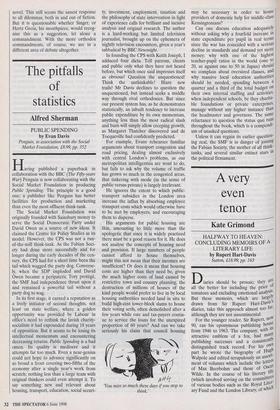The pitfalls of statistics
Alfred Sherman
Having published a paperback in collaboration with the BBC (The Fifty-years War) Penguin is now collaborating with the Social Market Foundation in producing Public Spending. The principle is a good one: a publisher like Penguin has better facilities for production and marketing than even the most affluent think-tank.
The Social Market Foundation was originally founded with Sainsbury money to serve the Social• Democratic Party under David Owen as a source of new ideas. It claimed the Centre for Policy Studies as its model. However, the CPS was not a run- of-the-mill think-tank. As the Fabian Soci- ety had done more successfully and for longer during the early decades of the cen- tury, the CPS had for a short time been the tail which wagged the party dog. Converse- ly, when the SDP imploded and David Owen became a peripatetic Tory protégé, the SMF had independence thrust upon it and remained a powerful tail without a party dog to wag.
In its first stage, it earned a reputation as a lively initiator of second thoughts, not least on state welfare, where a golden opportunity was provided by Labour in office's need to rethink the lavish charity- socialism it had expounded during 18 years of opposition. But it seems to be losing its intellectual momentum and encountering decreasing returns. Public Spending is a bad omen. Its quality is mediocre and it attempts far too much. Even a near-genius could not hope to advance significantly on so broad a front covering two-fifths of the economy after a single year's work from scratch; nothing less than a large team with original thinkers could even attempt it. To say something new and relevant about housing, transport, education, social securi- ty, investment, employment, taxation and the philosophy of state intervention in light of experience calls for brilliant and incisive analysis and original research. The author is a hard-working but limited television journalist, brought up on the ephemera of nightly television encounters, given a year's sabbatical by BBC Newsnight.
In founding the CPS with Keith Joseph, I adduced four dicta. Tell patrons, clients and public only what they have not heard before, but which once said impresses itself as obvious! Question the unquestioned! Think the unthinkable! Blaze new trails! Mr Davis declines to question the unquestioned, but instead seeks a middle way through rival orthodoxies. But since our present system has, as he demonstrates statistically, an inbuilt tendency to increase public expenditure by its own momentum, anything less than the most radical slash and burn will simply allow creeping growth, as Margaret Thatcher discovered and de Tocqueville had confidently predicted.
For example, Evans rehearses familiar arguments about transport congestion and road pricing, dealing almost exclusively with central London's problems, as our metropolitan intelligentsia are wont to do, but fails to ask why the volume of traffic has grown so much in the congested areas, that tinkering with mode (in the sense of public versus private) is largely irrelevant.
He ignores the extent to which public- transport subsidies in the London area increase the influx by absorbing employee transport costs which would otherwise have to be met by employers, and encouraging them to disperse.
His arguments for public housing are thin, amounting to little more than the apologetic that since it is widely practised there must be a good reason for it. He does not analyse the concepts of housing need and provision. If large numbers of people cannot afford to house themselves, might this not mean that their incomes are insufficient? Or does it mean that housing costs are higher than they need be, given the much higher costs of land caused by restrictive town and country planning, the destruction of millions of houses of the kind people would prefer to live in by local housing authorities needed land in situ to build high-cost tower-block slums to house their voting serfs, often demolished after a few years while rate and tax-payers contin- ue to service the loans for the unexpired proportion of 60 years? And can we take seriously his claim that council housing 'You miss so much these days if you stop to think.' may be necessary in order to house providers of domestic help for middle-class Kensingtonians? Can one discuss education adequately without asking why a fourfold increase in state expenditure per pupil in real terrns since the war has coincided with a serious decline in standards and demand yet more money; why with one of the highest teacher-pupil ratios in the world (one to 20, as against one to 50 in Japan) should we complain about oversized classes, and why massive local education authorities should be needed, spending between a quarter and a third of the total budget on their own internal staffing and activities, when independent schools, be they charita- ble foundations or private enterprises, manage without any higher instance than the headmaster and governors. The same reluctance to question the status quo rilUs throughout the book, which is a compendi- um of unasked questions.
Unless it can regain its earlier question- ing zeal, the SMF is in danger of joining the Fabian Society, the mother of all think - tanks, and several similar extinct stars in the political firmament.


























































 Previous page
Previous page